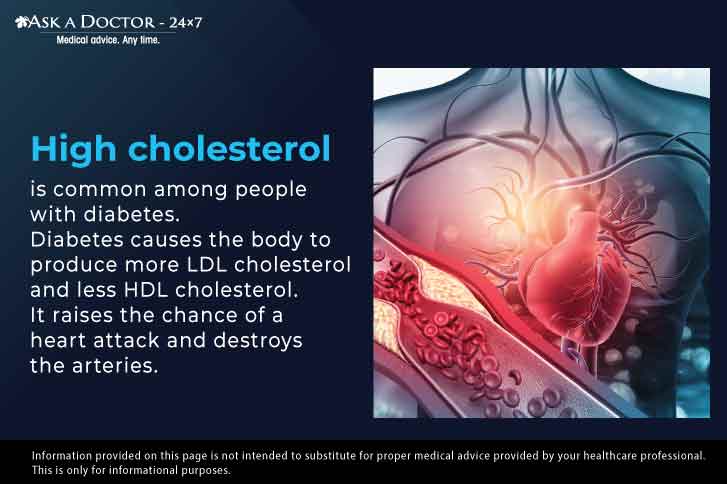What Happens To Your Body When Cholesterol Is High?
High cholesterol is when you have an increased amount of a fatty substance called cholesterol in your blood. Your body requires cholesterol to make hormones, vitamin D, and substances that help you digest foods. However, when there is an accumulation of excess cholesterol in the body, there is difficulty in blood flow.
Significant restriction in blood flow results in blockage in the blood vessel or artery. This increases the risk of a heart attack or similar conditions. Let us understand the effects of high cholesterol on your body and how you can reverse it by making lifestyle changes.
Types of Cholesterol
Do you know that not all cholesterol is made equally? There are two types of cholesterol, namely LDL (low-density lipoprotein) and HDL (high-density lipoprotein).
- Low-density lipoprotein is a "bad" cholesterol that creates a fatty buildup (plaque) on the inside of your arteries, raising the risk of heart disease and stroke. Doctors are particularly concerned about elevated levels of LDL.
- High Density lipoprotein or HDL is a good cholesterol that absorbs and carries excess cholesterol to your liver. It is then eliminated from the body by the liver. If your HDLs are low, you will have excess cholesterol in your bloodstream.
Causes of High Cholesterol

Let’s look into the main causes of high cholesterol:
- Family history: Typically, the cholesterol levels of family members are comparable. This implies that having harmful cholesterol levels may be influenced by your genes.
- Unhealthy Diet: Your cholesterol may be raised or lowered by certain food items. Eating foods high in saturated fats increases bad cholesterol in your body. You should consume no more than 10% of your daily calories from saturated fats.
- Tobacco usage and smoking: Smoking increases your “bad cholesterol” (LDL) and lowers your “good cholesterol” (HDL).
- High stress: Stress raises certain hormones like corticosteroids in our body. Hormonal changes brought on by stress lead to the production of cholesterol in the body.
- Alcohol consumption: Consuming too much alcohol might cause an increase in total cholesterol.
- Sedentary lifestyle and being overweight: You won't have enough “good cholesterol” in your body if you work a desk job or spend a lot of time sitting down. Lack of physical activity and being overweight can raise your cholesterol.
- Medical conditions: Certain medical conditions like obesity, diabetes, high blood pressure, chronic kidney disease, and hypothyroidism lead to increased bad cholesterol in your body.
Effects of High Cholesterol on Your Body
Here are some things that can happen to your body when cholesterol is high:
- Narrowing of the arteries: An excessive amount of low-density lipoprotein (LDL) cholesterol can build up on the inside of your blood vessels and arteries, causing them to gradually narrow. Due to the buildup of cholesterol deposits (plaque), the arteries become harder and narrower, restricting the blood flow to the heart.
- High blood pressure: High cholesterol and high blood pressure are related. Your arteries harden and constrict as a result of calcium buildup and cholesterol plaque. Therefore, the effort required by your heart to pump blood through them is greater. Your blood pressure may rise as a result.
- Peripheral arterial disease: High cholesterol can also damage arteries in the arms or legs due to the reduced blood flow caused by cholesterol plaque in your arms or legs. This leads to pain or cramping in your legs while walking or exercising which goes away with rest.
- Angina or heart attack: Angina (chest pain) results from a reduction in the blood supply carrying oxygen to your heart, resulting in chest pain (earliest indicators of blockage), while a heart attack develops due to the rupture of a plaque or clot that blocks the artery that carries blood and oxygen to your heart.
- Stroke: A stroke happens when a blood clot stops blood flow to a portion of your brain, just like a heart attack that results from blockages to the heart.
Note: Both heart attack and stroke is a medical emergency. Both require prompt treatment to prevent death.
7 Steps to Prevent High Cholesterol
Making lifestyle adjustments is crucial to controlling high cholesterol. One must do the following to manage high cholesterol:
- Reduce your intake of saturated fats and processed food: Fast food and packaged snacks and desserts have high levels of saturated fats. Check food labels to see what type of fat is in it. Eat a balanced diet that’s high in fiber, consisting of fruits and vegetables.
- Reduce extra weight: If you are a woman with a waist circumference of at least 35 inches or a male with a waist circumference of at least 40 inches, your risk of having elevated cholesterol levels increases. Try to lose extra pounds and maintain a healthy weight.
- Get cholesterol checked regularly: Have your cholesterol and triglycerides checked by your doctor regularly.
- Consume less sodium (salt): Some food items have hidden salt. It's crucial to read labels when shopping.
- Give up using tobacco products and smoking: Smoking increases your risk of heart attack, stroke, and kidney damage. If you are seeking help to stop smoking, consult your physician for advice.
- Exercise more: Try to work out for at least 150 minutes or 2.5 hours a week. Aerobic exercise is one type of physical activity that lowers cholesterol levels. You can go for walking, running, swimming, cycling, etc.
- Drink alcohol in moderation: Avoid consuming more than 14 units of alcohol a week. Also, refrain from binge drinking (consuming large amounts of alcohol quickly).
We have learned that over time, high cholesterol can clog your arteries, aggravate heart disease, and raise your risk of stroke. Regularly seeing your doctor to get your cholesterol evaluated and reducing your risk of heart disease through diet, exercise, and lifestyle modifications can help reduce heart disease complications and enhance your quality of life. If the lifestyle changes do not lower your cholesterol levels, you might also need to take cholesterol-lowering medications as prescribed by your doctor.
You can consult our healthcare team at Ask a Doctor, 24x7, and discuss related to high cholesterol to prevent its complications.
Recently Answered Queries Related to Cholesterol and Heart Health
- What Does This Lipid Profile Test Report Indicate?
- What Do Cholesterol Levels Of 189 And Triglycerides Of 107 Indicate?
- Suggest Tests To Determine Cholesterol Levels In Blood
- Could High Cholesterol And Elevated BP Be Side Effects Of Hormone Medicines?
- What Causes Severe Edema In The Legs Without Any Other Signs Of Injury?
- Suggest Medications For Fatty Liver As Per The Attached Reports
- Does Xanax Cause Low Blood Pressure?
- What Do The Attached Medical Reports Indicate?
Disclaimer: Information provided on this page is not intended to substitute for proper medical advice provided by your healthcare professional. This is only for informational purposes.
Ask a Specialist
Recent Questions


